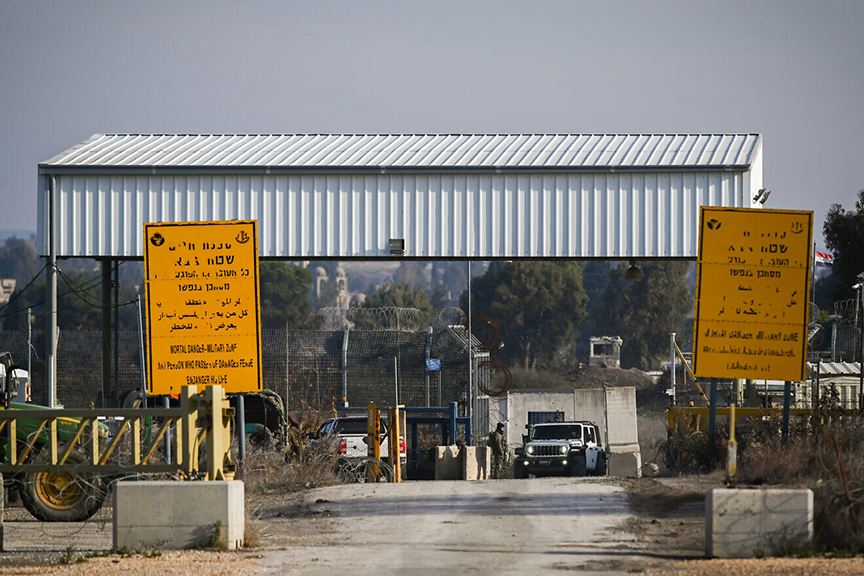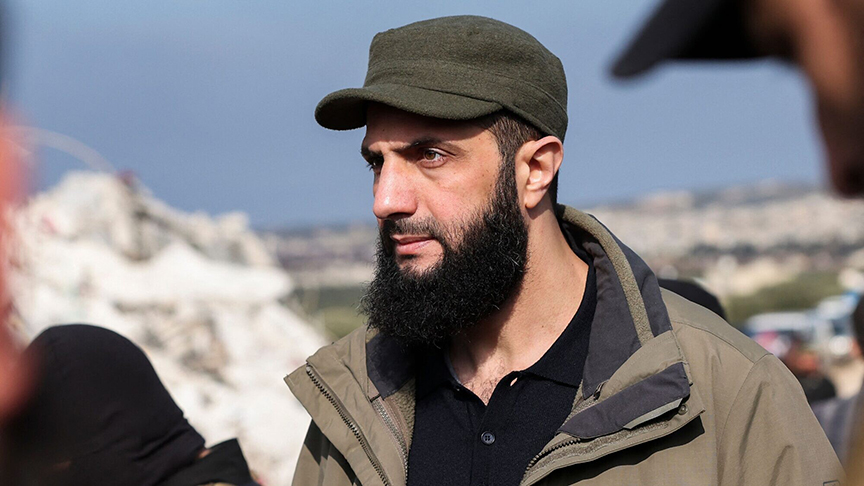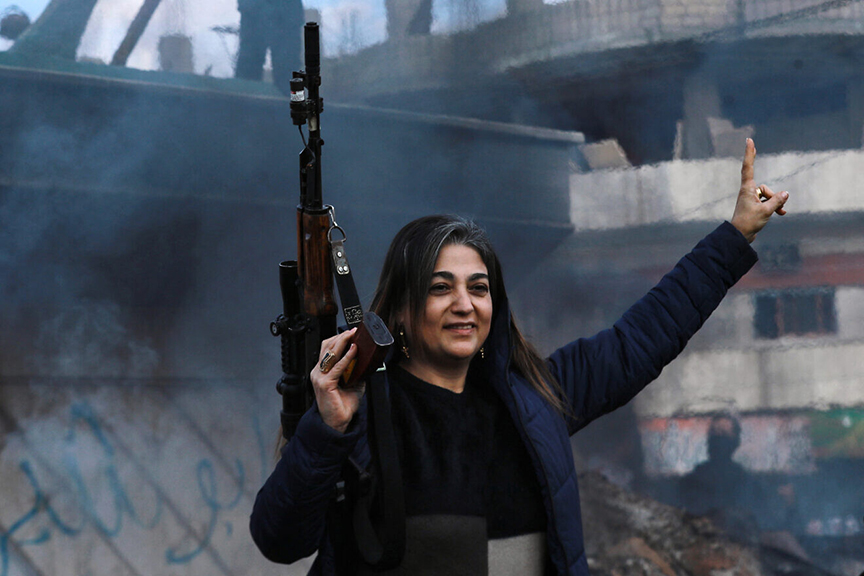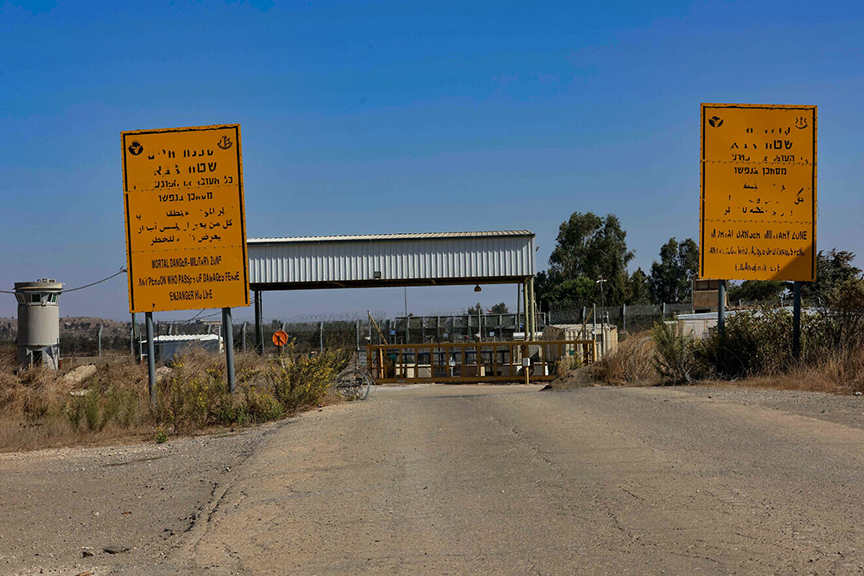IDF deploying to buffer zone with Syria after regime’s collapse

IDF troops guard the Israeli side of the border with Syria in the Golan Heights, Dec. 8, 2024. Photo by Michael Giladi/Flash90.
(JNS) — Israel Defense Forces troops have been deployed to the demilitarized buffer zone on the northern border with Syria and “several other places necessary for its defense,” the IDF said on Dec. 8, as rebel groups took control of Damascus, bringing down the regime of President Bashar Assad.
The IDF said the move, which followed a situational assessment, was taken to avoid a scenario of “armed personnel” entering the buffer zone, which was established by the 1974 Disengagement of Forces Agreement between Damascus and Jerusalem and ended the 1973 Yom Kippur War.
Troops were deployed “to ensure the safety of the communities of the Golan Heights and the citizens of Israel,” the army stressed. “We emphasize that the IDF is not interfering with the internal events in Syria. The IDF will continue to operate as long as necessary in order to preserve the buffer zone and defend Israel and its civilians.”
The IDF on Dec. 8 issued new guidelines for civilians in the north, ordering the suspension of educational activities in the four Druze towns in the Golan Heights. In addition, the IDF declared a closed military area in some agricultural fields near the border.
Assad fled Damascus after a coalition of rebel groups stormed the capital, ending his family’s five-decade rule. Syria’s army command notified officers that the regime had fallen, an officer who was informed of the move told Reuters.
Footage verified by CNN showed rebel fighters entering the presidential palace in Damascus on the morning of Dec. 8, firing in the air in celebration.
Rebel fighters declared the capital “liberated” in a televised statement carried on state television. “Damascus has been liberated, and the tyrant Bashar Assad has been overthrown,” a spokesman stated, adding that “prisoners in regime prisons have been released.”
An official in Iran’s Islamic Revolutionary Guard Corps told The New York Times that the fall of Assad’s rule was a “Berlin wall moment” for Tehran’s Axis of Resistance, which includes Hamas, Hezbollah, Islamic Jihad, the Houthis and other Iranian-backed terrorist groups in the region.
The Syrian Observatory for Human Rights, a London-based war monitor, reported that “hundreds” of Iranian-backed fighters were in the process of withdrawing to Iraqi territory.
Overnight on Dec. 7, Israeli Air Force jets reportedly struck fleeing Hezbollah convoys on the Lebanon-Syria border. In addition, local reports claimed IAF jets carried out waves of strikes in the Damascus area to destroy weapons depots that could fall into the hands of rebels.
Israel’s ruling Likud Party banned government ministers from publicly commenting on the situation in Syria.
Mount Hermon
Earlier on Dec. 8, Minister for Diaspora Affairs and Combating Antisemitism Amichai Chikli (Likud) urged the government to reclaim control of the part of Mount Hermon, in the Golan Heights, that Israel does not already have and deploy forces along the 1974 truce line.
“Israel should renew its control of the peak of the Hermon and establish a new defensive frontier on the basis of the 1974 disengagement line — we must not let jihadists entrench themselves near our communities,” he said.
Chikli warned that while U.S.-designated Hayat Tahrir al-Sham — which led the surprise push to oust Assad — has “rebranded,” much of Syria remains under the influence of al-Qaeda and ISIS affiliates.
The Israeli minister added that the strengthening of the Kurdish-led, U.S. supported Syrian Democratic Forces and the expansion of its control in the northeast was a positive development to come out of the recent events.
Assad’s forces completely lost control of the border with Israel, which has been taken over by opposition forces and local terrorist groups, Israel’s Kan News reported on Dec. 7, citing Syrian sources.
Over the weekend, the IDF assisted a U.N. force to repel a rebel attack in the Syrian part of the Golan Heights, the military announced. “An attack by armed militants against a U.N. post in the Hader region of Syria was detected,” the IDF said, adding that it “bolstered its deployment on the Golan Heights front and will continue to protect the State of Israel.”
Prime Minister Benjamin Netanyahu announced on Dec. 1 that Jerusalem was constantly monitoring the situation in Syria, speaking after jihadist rebels seized control of Aleppo, the country’s commercial capital and second-largest city.
“We are determined to both protect the vital interests of the State of Israel and preserve the achievements of the war,” the premier told IDF recruits at the Tel Hashomer induction center in Ramat Gan.
Jerusalem has been treating the rebels’ and jihadists’ advances in Syria with caution, with intelligence warning that the developments could ultimately spell trouble for the Jewish state.
Intelligence chiefs cautioned that the collapse of the regime had the potential to create turmoil in which threats against Israel could develop.
Israel’s intelligence establishment, including the Mossad and the IDF’s Military Intelligence Directorate, reportedly failed to predict the regime’s collapse. Jerusalem developed a strategy based on Assad staying in power with Russian backing, Ynet said.



